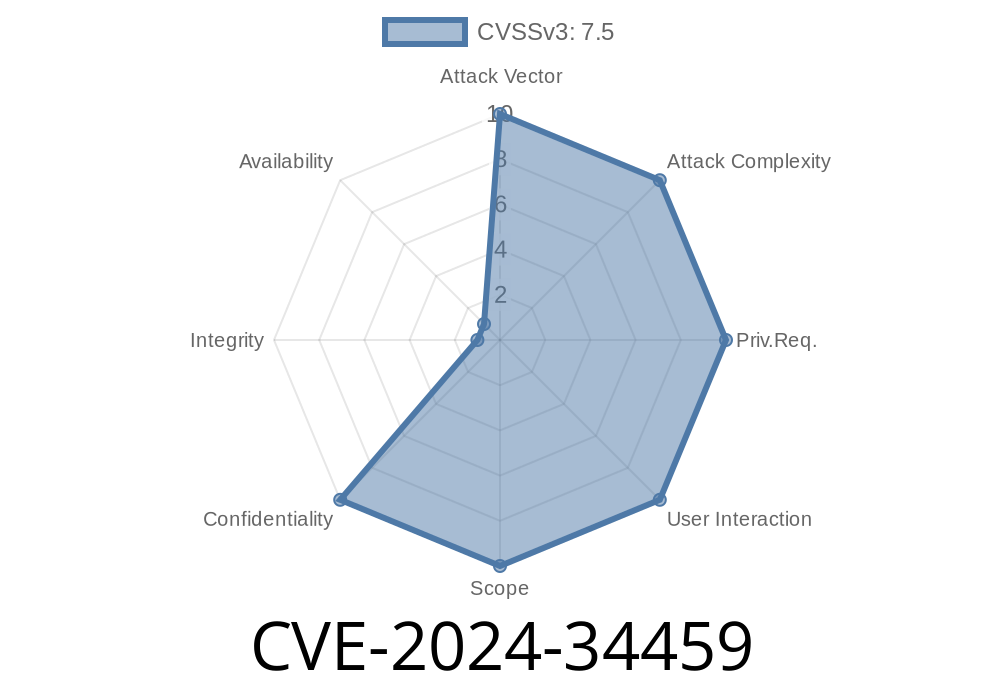A newly discovered bug—CVE-2024-34459—in the popular XML parsing tool xmllint (from the libxml2 library) could bring some serious trouble, especially if you use the --htmlout flag. This flaw, a buffer over-read, was found in the xmlHTMLPrintFileContext function in xmllint.c affecting versions of libxml2 before 2.11.8 and the 2.12 series before 2.12.7. Let's break it all down in plain English, look at the roots of the issue, review potential exploits, and see how to stay safe.
1. What is xmllint and Why Does It Matter?
xmllint is a command-line tool that comes with libxml2—the XML parsing library used by thousands of open source projects and popular distros. You use it to check and pretty-print XML files, validate schemas, and even process HTML pretending it’s XML.
2. Where’s the Problem?
The bug lies in how xmllint handles error reporting when you ask it to output HTML (--htmlout). Under certain situations, a formatting error message can trigger a buffer over-read in the C function xmlHTMLPrintFileContext. That means the program will read memory it shouldn’t, which can sometimes be exploited to leak information or even crash the tool.
3. The Heart of the Bug
Here’s a simplified snip from the upstream patch (you can also check the CVE announcement):
static void
xmlHTMLPrintFileContext(FILE *output, xmlParserInputPtr input) {
const char *cur;
int len;
cur = input->base;
len = input->cur - input->base;
// The bug: if 'len' goes beyond the actual buffer, we get an over-read
fwrite(cur, 1, len, output);
}
This is a classic buffer over-read.
- If producing an error message as HTML, the output context gets malformed and potentially leaks memory.
This bug is not a direct code execution vulnerability, but can have consequences
- Denial of Service: If you feed a specially crafted XML file, xmllint might crash, denying service.
- Information Disclosure: If the buffer over-read includes sensitive information (possibly other memory from the same process), you might leak data. This is relevant if xmllint is exposed as a web service or used in automated pipelines.
Pipe it through xmllint --htmlout to get an error output.
3. If the boundary conditions are just right, you might see garbage data included in the error context (over-reading the buffer).
<!-- exploit.xml -->
<!DOCTYPE foo [
<!ENTITY a SYSTEM "file:///etc/passwd">
]>
<foo>&a;</foo>
Run:
xmllint --htmlout exploit.xml
Based on the bug, under some conditions, this might pull extra memory out into the HTML output. (Note: The actual exploit might require crafted files targeted to the internal buffer mechanics of xmllint’s parser.)
5. How Was It Fixed?
Here’s what the maintainers did in the patch:
// Add boundary check before writing
if (input->cur > input->end)
len = input->end - input->base; // Clamp length to buffer limit
else
len = input->cur - input->base;
This ensures that no more data is read than actually exists in the buffer.
Upgrade libxml2 to at least 2.11.8 or 2.12.7. That fixes the bug.
2. If you supply untrusted XML files to xmllint with --htmlout (for example, via a web application), patch immediately.
Watch for error outputs: if strange data shows up in parsing errors, you might be exposed.
Check your version:
xmllint --version
If the output says you’re below 2.11.8 or (for 2.12 series) 2.12.7—you’re at risk.
7. References
- NVD CVE-2024-34459
- libxml2 official xmllint docs
- Patch for CVE-2024-34459
- libxml2 release notes
8. Summary
CVE-2024-34459 is a buffer over-read bug in xmllint’s error reporting with --htmlout. While it won’t let attackers run code, it could leak memory or crash the tool, which matters for anyone processing untrusted XML inputs with xmllint, especially in automated or web-facing scenarios. Patch fast, stay safe!
Timeline
Published on: 05/14/2024 15:39:11 UTC
Last modified on: 08/22/2024 18:35:08 UTC
